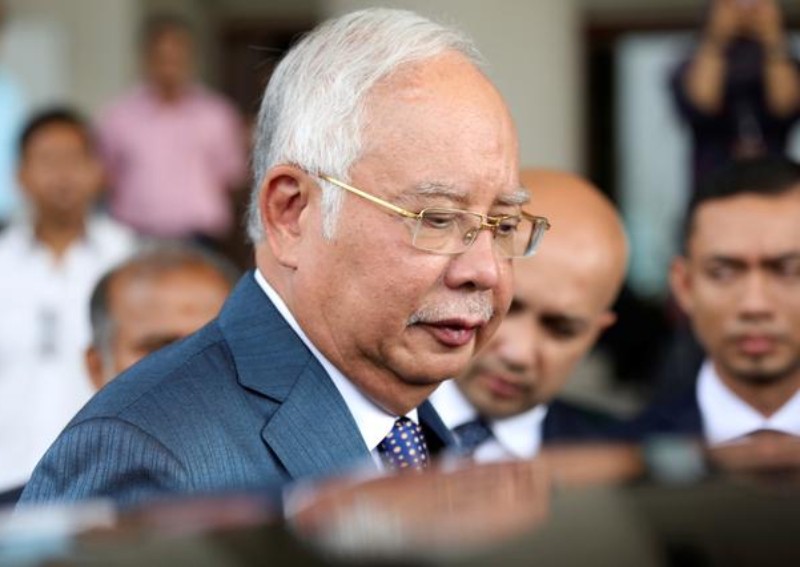In Malaysia, Najib Razak’s comeback hopes gain steam as rivals falter in Malacca state polls

Almost immediately after the Malaysian ex-premier Najib Razak and his party were voted out in the 2018 general election on the back of the 1MDB financial scandal, the veteran politician began a campaign to rehabilitate his tattered image.
Off went the expensive tailored suits, and in came a new Najib who was frequently spotted hobnobbing with the working class in jeans, polo tees and sneakers.
Supporters christened him “bossku” [My Boss] and “malu apa bossku?” [What’s there to be ashamed of, boss?] became a popular catchphrase.
That effort has ebbed and flowed in the three-and-a-half years since the watershed vote, but analysts say his chances of a comeback are now rapidly gaining steam — even as a 12-year jail term for his role in the multibillion dollar plunder, and possibly more such convictions, loom over him.
Reinforcing that view was the resounding victory he engineered for the United Malays National Organisation (Umno) in a snap bypoll on Saturday in Malacca, the country’s second-smallest state.
Facing off with the opposition Pakatan Harapan alliance led by Anwar Ibrahim and Umno’s partners in the national government, the Perikatan Nasional bloc, the party won two thirds of the 28 seats in the state assembly.
While Prime Minister Ismail Sabri Yaakob, an Umno man, and party chief Ahmad Zahid Hamidi outrank Najib within the group, it was the 68-year-old who was seen as calling the shots during the hustings.
“We were faced with repeated attacks and slanders from opponents,” Najib wrote on Facebook after results were confirmed on Saturday night. “The people chose stability for the sake of prosperity.”
Najib’s tribulations had threatened to hurt Umno’s chances ahead of the poll, after revelations last week that he had been seeking land and a house worth 100 million ringgit (S$32.5 million) as an entitlement for being a former prime minister.
After the issue became a talking point in parliament, Najib said he was withdrawing the request.
James Chin, a Malaysia politics analyst with Australia’s University of Tasmania, said the return of Najib to the apex of politics — thought as impossible following his conviction last year in the first of several 1MDB cases — was now within the realm of possibility.
Expectations are that with victory in Malacca, Najib is likely to persuade Ismail Sabri to call a snap national election sooner rather than later.
The prime minister has a standing agreement with the opposition to avoid polls until at least next July as part of a deal to cool temperatures following unprecedented political turmoil earlier this year.
But the performance of Umno — Malaysia’s oldest political party — against Pakatan Harapan and Perikatan Nasional is likely to trigger a rethink of that deal. Analysts suggested the result showed that whatever antipathy voters had towards Umno in the 2018 poll may be dissipating.
The 2018 vote, won by Pakatan Harapan, ended Umno’s uninterrupted 61-year tenure in power and promoted intense navel gazing within its ranks on its future.
“If this pattern is repeated in the general election, Umno will be swept back into office and it is quite clear that Najib and Zahid Hamidi will call the shots,” Chin said.
Zahid Hamidi, 68, is facing corruption charges of his own, though his cases are not linked to the 1MDB scandal.
Najib faces battles ahead
The path to the prime ministership for Najib is not straightforward, as it would require several developments to take place in concert: prosecutors will have to drop charges against him, or if they had already been convicted by the time polls are called, the appeals process must be exhausted.
Another scenario is that he receives a royal pardon for the various charges he is facing.
The Kuala Lumpur High Court last year sentenced Najib to 12 years in jail in the first 1MDB-linked trial, and that case is now being deliberated upon in the Court of Appeal — the country’s second highest court.
Subsequently, it can be escalated to the highest judicial body, the Federal Court. Some experts say the law prohibits Najib from running in any future general election owing to his standing criminal conviction, but the politician in September said his disqualification was “subject to interpretation”.
The Malacca result was not just about Najib, however. Chin suggested Umno’s rivals would have much to think about after the defeat.
In particular, the outcome was a “rebuke” for the Parti Pribumi Bersatu Malaysia (PPBM) of Muhyiddin Yassin, he said.
PPBM is part of the Ismail Sabri’s national ruling coalition, but it is at odds with Umno as both sides vie to be the party of choice for the country’s majority Malay Muslims.
Muhyiddin was in power from March 2020 to August 2021 after gaining power following a messy political struggle. He was forced to resign after a pressure campaign spearheaded by Najib’s faction within Umno.
Both parties champion Malay nationalism, and admit only Malay members.
“The Malaysian mountain is too small for two tigers; Umno will attempt to politically kill off Bersatu in the next general elections,” Chin opined.
Ethnic-based voting
Online, the opposition Pakatan Harapan’s leader Anwar was also facing brickbats. The bloc’s supporters and critics alike drew attention to his decision to accept a defector to contest the polls, contrary to the alliance’s long-time campaign against party hopping.
The candidate in question, Idris Haron, had in the first place triggered the poll by pulling support for the incumbent state government. He lost to the Umno candidate in the by-election.
“It is a huge mistake that did not help bring a win and instead brought a massive defeat for Parti Keadilan Rakyat,” said University of Malaya sociopolitical analyst Awang Azman Awang Pawi, referring to Anwar’s party. PKR is one of three parties in the Pakatan Harapan alliance. PKR lost all 11 seats it contested in.
Tunku Mohar Mokhtar, a political analyst with the International Islamic University, said on a broader level Saturday’s result -— seen as a barometer of what is to come — showed that one aspect of Malaysian politics had not changed: ethnic-based voting.
“In terms of ethnicity, Umno is strong in Malay-majority areas, and the Democratic Action Party in Chinese areas,” he said, referring to the Chinese-centric party which is part of Pakatan Harapan. The DAP won four seats.
On the ground, This Week in Asia’s interviews with voters signalled that they were disillusioned by the incessant politicking in the country, as well as the constant defections among the various camps.
“The politicians only think about what’s in it for them, not about the people. What’s the point in voting when what they will do is just jump around again after the election?” one voter asked.
Such desertions have been at the heart of Malaysia’s roller coaster style-politics since the 2018 polls.
The apathy played out in voter turnout as well: Just 65.85 per cent or 326,068 eligible Malacca electorate turned up to vote on Saturday, down from 84.52 per cent in the 2018 general elections.












Leave a Reply